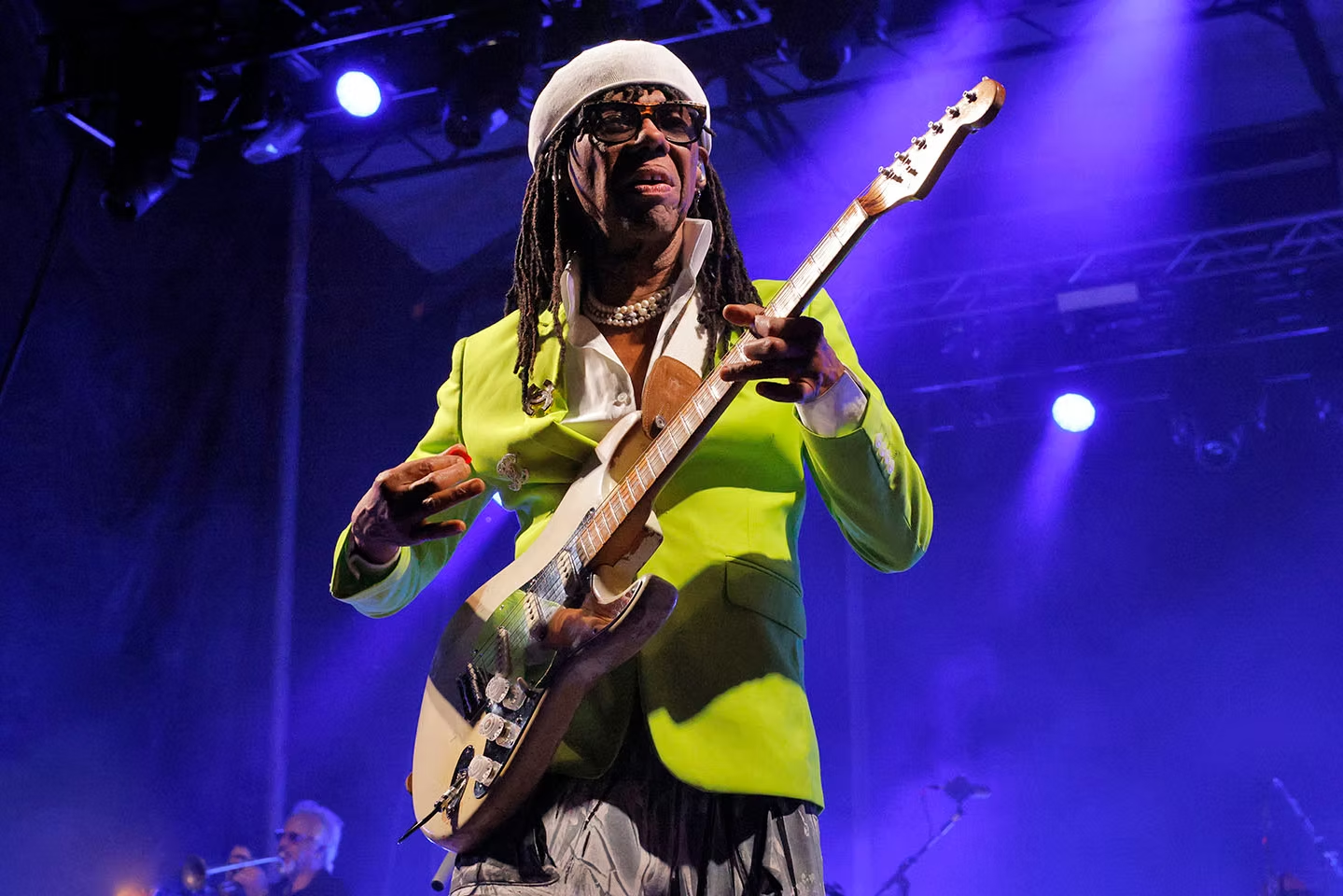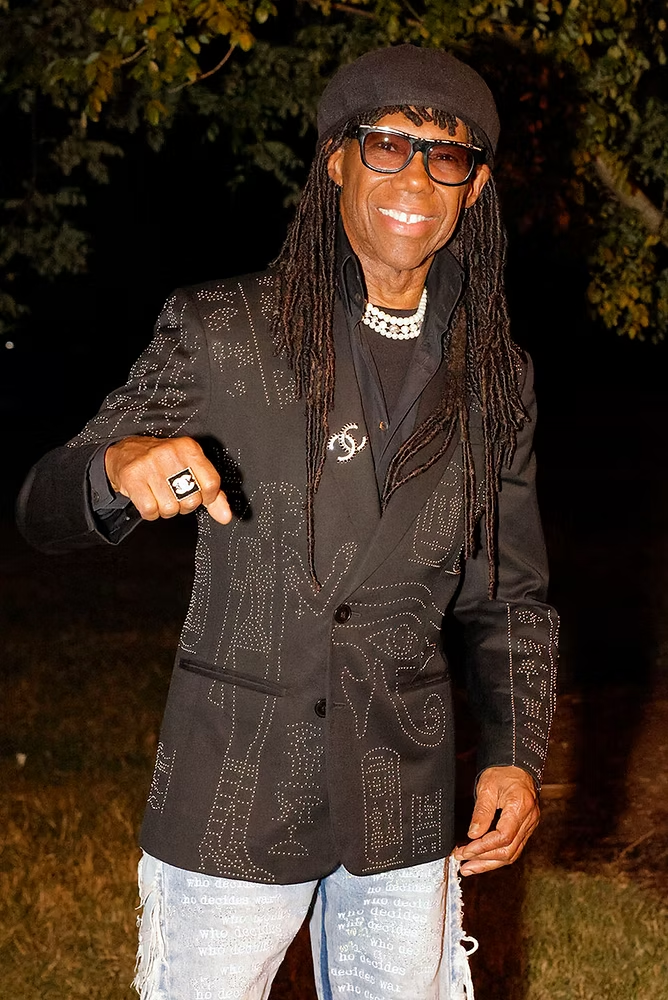 Photos: Cory Weaver
Photos: Cory Weaver
There’s so much to say about Nile Rodgers. A 50-year career, creating hit after hit with his bands Chic and Sister Sledge, and collaborations with artists like Diana Ross, David Bowie, Duran Duran, Pharrell and Daft Punk. Chances are, without Rodgers, Madonna’s “Like A Virgin” would sound much different. Bowie’s “Let’s Dance,” arguably his biggest hit, was transformed by Rodgers—taking it from a folky, 12-string guitar riff to certified smash.
Rodgers is more than just a producer, musician, writer. He, as he says, is an arranger—of the most epic proportions. He and his late collaborator and bandmate, Bernard Edwards, defined an entire era, and Rodgers had his hand in some of the biggest hits of the past 40+ years.
Early afternoon, while already on site at Evolution Festival, the call came in that we’d have 10 minutes with the legendary Nile Rodgers. You might think, “10 minutes—that’s it?” But, before taking another breath, before blinking…we took it and ran with it.

To rewind a bit, Wil Thomas, this magazine’s Artist Liaison, put in a call and the deal was set. We both agreed that we didn’t want to be the ones to interview Nile, so we tapped local legend and bassist Donald Williams (Sinister Dane, Sugar Daddy, Getaway Car, Superhero Killer) for this limited engagement.
As Billy Idol was doing his thing on the main stage, Williams, Thomas and I were invited to cram into a golf cart and were whisked away to Rodgers’ trailer, where we dove right in. There was no time to waste.
DW: You’ve had an incredibly diverse career, from Chic, to producing for legends like David Bowie, Madonna, Duran Duran, Daft Punk. What’s your secret or your approach to reinvention?
NR: I always believe that no matter what the music is, no matter what the style—classical, jazz, R&B, blues, anything—that I always believe in my heart, that I can contribute something. That I could make it better. I think of myself as an arranger and thank God I can use my guitar to develop the arrangements, and a lot of the time that works. But I can write, you know, horn parts and string parts.
DW: Do you play other instruments?
NR: Not well, but I can. I’m, you know, I’m an arranger. I write proper old school—whip out the pen and paper.
DW: All right, one more. Dead or alive, what’s a collaboration you wished you would have done?
NR: So easy. Miles Davis asked me, now man, I want you to write me a muthafuckin’ “Good Times.”’ And then, we became good buddies, because he was living on 79th Street [New York City], and I just bought my girlfriend an apartment on 80th Street, and our places butted up against each other. So, he would tell me to call him after 10 o’clock every night—we’d go out, party. I had just done an Issey Miyake fashion shoot with him, so that’s how we got tight. So, we’d start partying. And, you know, Miles had a rough edge to him every now and then, and he could go off, but he was always kind to me, and I was always expecting him to go off.
So, I thought what he was doing was setting me up. So we’d be partying, having a good time and he’d say, “now, man, I want you to write me a ‘Good Times.’
And so, I’d go home and I’d write a jazz fusion song. And he’d go, “I can write that shit! Marcus (Miller) can write that shit! I want ‘Good Times.’” And he kept saying that shit. I wrote maybe four or five cuts, and they were always jazz fusion. It’s Miles, I’m trying to blow him away.
And so, I broke up with my girlfriend and moved to my side of town, the other side of town, and I never saw Miles again, but I listened to the records that he was putting out, and he was covering like “Human Nature,” ‘oh, he really wanted to be on the radio.’
And I felt terrible because I thought, man, he was really serious, and I didn’t take him seriously. But he was dead serious. And it was interesting, because my relationship with Miles was so normal, I was almost waiting for him to go off, you know what I mean?
So, it’s like people will have these odd reputations. You wait for them to go off. He never went off. It was always cool. So, I kept thinking that when I wrote “Good Times,” he was gonna go off, “fuck that man,” right!? I’m not gonna pour my heart and soul into somethin’ and have you diss it.
I was just pouring my brain into it. And I didn’t mind him dissin’ that, I was like, “Okay, it’s just not deep enough for him, I can take that criticism,” but if I’m trying to do something that really is going to move people, and [if] he goes, “Man, that’s bullshit… you think I’m gonna play that bullshit?” (We ended here, as he was minutes from going on stage for his set.)
Though our time with him was limited, we were fortunate to get a glimpse into Nile Rodgers’ extraordinary career in his own words. His passion for music and his unique approach to arranging have left an indelible mark on the industry, and his influence is undeniable. It’s clear that his dedication to creating and reinventing music continues to inspire artists and fans alike. He’s a true visionary whose legacy will resonate for generations to come.
